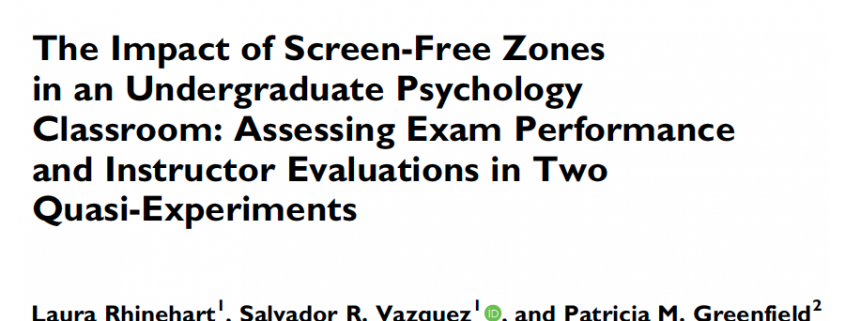Summary of “The impact of screen-free zones in an undergraduate psychology classroom: Assessing exam performance and instructor evaluations in two quasi-experiments”
Summary of Rhinehart, L., Vazquez, S. R., & Greenfield, P.M. (2021). The impact of screen-free zones in an undergraduate psychology classroom: Assessing exam performance and instructor evaluations in two quasi-experiments. Teaching of Psychology, https://doi.org/10.1177/00986283211017443
Many undergraduates look at screens during lectures. The instructor in Psychology 133G, Prof. Patricia Greenfield, and two long-term TAs, Dr. Laura Rhinehart and Salvador Vazquez, became concerned about the distraction produced by screens in class and decided to address the issue through both research and practice. Two quasi-experimental studies in Psychology 133G, Culture and Human Development, explored results of restricting screens to one area of the classroom on exam performance and instructor evaluations. Their results have been recently published in Teaching of Psychology, a journal of the American Psychological Association. (https://journals.sagepub.com/doi/full/10.1177/00986283211017443)
In both studies, these policies improved exam scores in the class. Students who chose to sit in the screen-free zone did better on exams. Horizontal division of the classroom where students could use their laptops only if they sat in the back few rows of the classroom produced student pushback in the form of qualitative comments on their evaluation forms and lower evaluations in quantitative instructor ratings. In contrast, vertical division of the classroom where one side was for screens and the other side was a no-screen section was accepted without comment by students. Together, these studies show that students who sit in screen-free sections tend to do better on assessments. Additionally, students accept vertical division of a classroom into screen and screen-free zones. Now that we are returning to classroom teaching, these studies can be useful for students and instructors alike; they imply that students will do better if they attend at least some lectures in a screen-free section. While screens are of course central to remote learning, the findings also imply that students should listen and view remote lectures with notifications turned off and without multitasking online, like checking email or social media.



